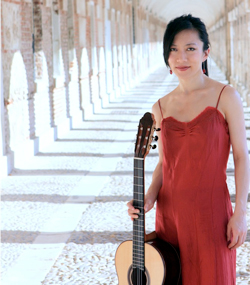by Daniel Hathaway

Yang went out on a limb with Bach’s G-minor Suite, performing it for the first time on a 7-string instrument that extended its range but, as she said, made the piece more difficult to play. Launching a program with Bach is always treacherous, and although her counterpoint was clearly rendered, Yang’s playing sounded tentative, beginning almost inaudibly and continuing with dynamic reticence throughout the work’s seven movements.
The guitarist swapped instruments for Paganini’s Grand Sonata, producing a robust, colorful tone, especially in its dramatic, octave runs. Though Yang might have channeled more of the composer’s stagecraft and virtuosic flair, her playing achieved a nice swagger, especially in the third-movement variations, which ended strikingly by vanishing into silence.
Yang’s own arrangement of Xu Changjun’s Sword Dance brought the first half of her concert to a brilliant conclusion. Expertly teasing a melody out of a series of tremolos, she conjured up the image of a folk dance haunted by the souls of the dead that began placidly and became increasingly animated.
Confessing her love of Brazilian music, Yang programmed the second half of her recital with music ranging from classical salon music to tunes inspired by folk and popular styles.
Three “Choros” (dance band pieces) by Villa-Lobos included a Mazurka, a Schottish, and a Waltz. More Romantic-flavored pieces by Reis — Uma Valsa e Dois Amores, Eterna Saudade, and Xodó da Baiana — gave Yang more complex textures and harmonies to work with.
A bit oddly, Yang programmed three pieces by Jobim to follow two works by Sardinha, the composer whose works influenced Jobim. Sardinha was a practitioner of samba, Jobim the inventor of bossa nova, and the influence of one style over the other might have been clearer had the two composers switched places. Never mind — it was fun to hear all these Brazilian works grouped together, and Xuefei Yang played them with rhythmic vitality, masterful technique, and deep affection.
Published on ClevelandClassical.com April 10, 2017.
Click here for a printable copy of this article



